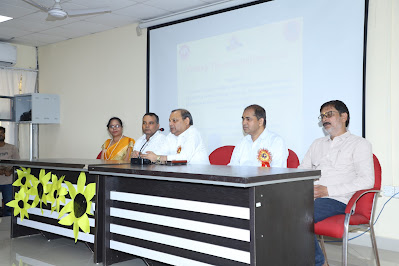प्रसार
भारती अधिनियम
प्रसार
भारती (ब्रॉडकास्टिंग कारपोरेशन ऑफ इंडिया के नाम से भी जानते हैं) भारत की एक
सार्वजनिक प्रसारण संस्था है। इसमें मुख्य रूप से दूरदर्शन एवं आकाशवाणी शामिल
हैं।
प्रसार
भारती का गठन 23 नवंबर, 1997 प्रसारण संबंधी मुद्दों पर सरकारी प्रसारण
संस्थाओं को स्वायत्तता देने के मुद्दे पर संसद में काफी बहस के बाद किया गया था।
संसद ने इस संबंध में 1990 में एक अधिनियम पारित किया लेकिन इसे
अंततः 15 सितंबर 1997 में लागू किया गया।
रेडियो और दूरदर्शन
को स्वायत्त देने वाले वर्तमान प्रसार भारती कानून का मूल नाम प्रसार भारती (भारती
प्रसारण निगम) विधान 1990 था। इसमें कुल चार अध्याय थे जो कुल 35 धाराओं – उपधाराओं में बंटे थे। अधिनियम के अनुसार रेडियो –
दूरदर्शन का प्रबंधन एक निगम द्वारा किया
जायेगा और यह निगम एक 15 सदस्यीय बोर्ड (परिषद) द्वारा संचालित होगा। परिषद में एक
अध्यक्ष, एक कार्यकारी सदस्य,
एक कार्मिक सदस्य, छह अंशकालिक सदस्य, एक – एक पदेन महानिदेशक (आकाशवाणी और दूरदर्शन), सूचना और प्रसारण मंत्रालय का एक प्रतिनिधि और
कर्मचारियों के दो प्रतिनिधियों का प्रावधान था। अध्यक्ष व अन्य सदस्यों की
नियुक्ति राष्ट्रपति द्वारा की जायेगी।
प्रावधानों के
अनुसार यह प्रसार भारती बोर्ड सीधे संसद के प्रति उत्तरदायी होगा और साल में एक
बार यह अपनी वार्षिक रिपोर्ट संसद के समक्ष प्रस्तुत करेगा। अधिनियम में प्रसार
भारती बोर्ड की स्वायत्ता के लिये दो समितियों का भी प्रावधान था -
संसद समिति और प्रसार परिषद। संसदीय समिति
में लोक सभा के 15 और राज्य सभा के 7 सदस्य होंगे जबकि प्रसार भारती परिषद में 11
सदस्य होंगे जिसे राष्ट्रपति नियुक्त करेंगे।
अधिनियम के अनुसार
प्रसार भारती के निम्न उद्देश्य
1 देश की एकता और
अखंडता तथा संविधान में वर्णित लोकतंत्रात्मक मुल्यों को बनाये रखना।
2 सार्वजनिक हित के
सभी मामलों की सत्य व निष्पक्ष जानकारी, उचित तथा संतुलित रुप में जनता को देना।
3 शिक्षा तथा
साक्षरता की भावना का प्रचार – प्रसार करना।
4 विभिन्न भारतीय
संस्कृतियों व भाषाओं के पर्याप्त समाचार प्रसारित करना।
5 स्पर्धा बढ़ाने के
लिये खेल – कूद के समाचारों को
भी पर्याप्त स्थान देना।
6 महिलाओं की
वास्तविक स्थिति तथा समस्याओं को उजागर करना।
7 युवा वर्ग की
आवश्यकताओं पर ध्यान देना।
8 छुआछूत – असमानता तथा शोषण जैसी सामाजिक बुराईयों का विरोध
करना और सामाजिक न्याय को प्रोत्साहन देना।
9 श्रमिकों के
अधिकार की रक्षा करना।
10 बच्चों के
अधिकारों की रक्षा करना।
Prasar Bharati (Broadcasting Corporation of India) Act, 1990
This Act extends to the whole of India. The Act provides for the
establishment of a Broadcasting Corporation. The Act defines composition,
powers and functions of the corporation. It grants autonomy to the All India
Radio and Doordarshan which were previously under the control of the
government. Section 3
of the Act deals with the establishment and composition of the corporation. The
corporation is a body corporate having perpetual succession and a common seal
with the headquarters in New Delhi.
Structure of the Prasar Bharati Board
The Act specifies General Superintendence, direction and management of
affairs of the corporation. Prasar Bharati Board does all such acts and
exercises all those powers which may be done by the corporation.
The Board shall consist:
- · Chairman
- · One Executive member
- · One member (Finance)
- · One member (Personnel)
- · Six Part-time members
- · Director-General (Akashvani), ex officio
- · Director-General (Doordarshan), ex officio
- · One representative of the Union Ministry of Information and Broadcasting (India), to be nominated by that ministry and
- · Two representatives of the employees of the corporation
The President of India appoints Chairman and other member except for
ex-officio members, a nominated member and the elected members. There shall be
not less than six meetings every year but three months shall not intervene
between one meeting and the next meeting.
Functions and Objectives of Corporation
The main motive of the corporation is to educate, inform and entertain
the public. By conducting and organizing public broadcasting services to
people, it has become easy to provide the information to the people in an easy
manner. It also ensures the balanced development of broadcasting on radio and
television.
The following objects are namely:
- · To provide the autonomy to Akashvani and Doordarshan, so that to ensure the function in a fair, objective and creative manner.
- · To uphold the unity and integrity of the country.
- · To maintain the democratic and social values which are enshrined in the constitution.
- · To look after the safeguarding of the citizen’s right to be informed freely, truthfully and objectively.
- · To spread literacy, agriculture, rural development, health, family welfare, environment, science and technology.
- · To encourage healthy competition and spirit of sportsmanship by providing adequate coverage to sports and games.
- · To promote cultures and languages of the various regions by broadcasting many programmes.
- · To provide special needs of the youth always organize special programmes.
- · To remove the problems of women, pay special attention to the upliftment of the women.
- · To take special steps for the protection of the children, the aged, the blind, the handicapped and other vulnerable section.
- · To protect the rights of working classes and advancing their welfare.
- · To provide the suitable programmes for the needs of the minorities and tribal communities.
- · To promote national integration that will maintain the community language of the nation.
- · To promote research and development activities of radio broadcast and television broadcast technology.





No comments:
Post a Comment
Please share your views